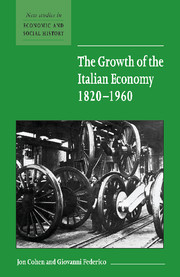Book contents
- Frontmatter
- Contents
- List of figures
- List of tables
- Acknowledgements
- 1 Introduction
- 2 Measuring change in the long run: the data
- 3 The big picture: models of growth and structural change
- 4 Modernization versus tradition: new views and old on agriculture
- 5 Against all odds? The growth of industry and services
- 6 Macroeconomic policy, institutions, and the balance of payments
- 7 An economic miracle? Italy in the Golden Age, 1945–1960
- 8 Conclusion
- Bibliography
- Index
- New Studies in Economic and Social History
- Previously published as Studies in Economic and Social History
- Economic History Society
2 - Measuring change in the long run: the data
Published online by Cambridge University Press: 05 June 2012
- Frontmatter
- Contents
- List of figures
- List of tables
- Acknowledgements
- 1 Introduction
- 2 Measuring change in the long run: the data
- 3 The big picture: models of growth and structural change
- 4 Modernization versus tradition: new views and old on agriculture
- 5 Against all odds? The growth of industry and services
- 6 Macroeconomic policy, institutions, and the balance of payments
- 7 An economic miracle? Italy in the Golden Age, 1945–1960
- 8 Conclusion
- Bibliography
- Index
- New Studies in Economic and Social History
- Previously published as Studies in Economic and Social History
- Economic History Society
Summary
2.1 After a brief burst of research on the economic causes of the Risorgimento (the political process of unification) in the 1950s and early 1960s, in large part stimulated by the centenary of Italian unification in 1961, historians lost interest in the economic history of pre-unification Italy. Thus, recent reviews of the literature by Pescosolido (1998) and Crepas (1999) have almost nothing new to say about the period 1815–1860. This is most unfortunate because, in spite of tantalizing suggestions by Cafagna (1989) and Bonelli (1979) – see chapter 3 – that modern economic growth in Italy probably predated unification, these and other issues have received very little attention. There are, moreover, underutilized sources of information on the period. In short, then, the pre-unification period is still awaiting the renaissance in economic history research experienced by other periods. The payoff to such renewed attention could be substantial.
Foreign trade statistics are the most reliable and by far the largest set of data we have on the real economy before 1861 (Federico 1991). We could, in principle, use these data to construct a ‘national’ trade series and, through them, gain insights into the real economy. In practice, it is a challenge. Differences in collection criteria, presentation, the efficiency of the statistical agencies, and the amount of smuggling between the pre-unification Italian states, make the construction of an aggregate series, at best, difficult. Only one state, Piedmont, has year-by-year trade data for the entire period 1815–61.
- Type
- Chapter
- Information
- The Growth of the Italian Economy, 1820–1960 , pp. 6 - 16Publisher: Cambridge University PressPrint publication year: 2001

